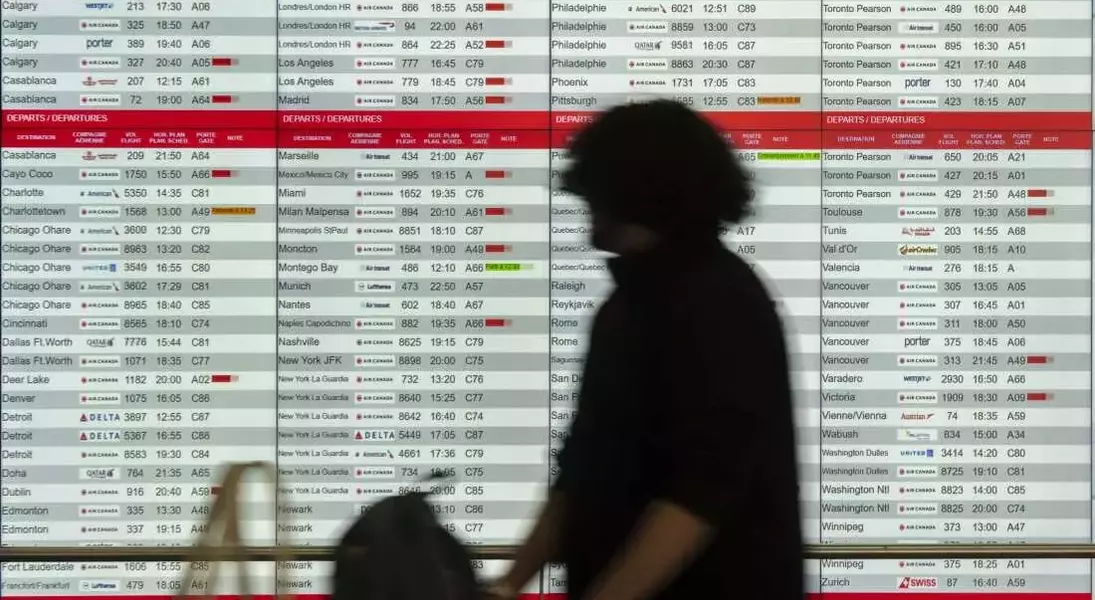
Air Canada has ceased all flight operations as more than 10,000 flight attendants initiated a strike early Saturday. This widespread industrial action, triggered by the collapse of protracted contract negotiations, has plunged the global travel sector into disarray, leaving countless passengers stranded during the bustling summer period. The airline and the Canadian Union of Public Employees (CUPE) have been engaged in discussions for eight months, but a resolution on critical issues such as compensation and the recognition of unpaid work hours remains elusive.
The flight attendants commenced their walkout around 1:00 AM EDT on Saturday, prompting Air Canada to immediately begin locking them out of airports. Hugh Pouliot, a spokesperson for CUPE, confirmed that the strike had begun after a definitive agreement could not be reached. Shortly thereafter, the airline announced the complete suspension of its services, underscoring the severity of the industrial dispute. This development follows the union's rejection of Air Canada's proposal for government-mandated arbitration, which would have forfeited their right to strike and allowed a third-party mediator to dictate contract terms.
In an attempt to avert the strike, Federal Jobs Minister Patty Hajdu convened with representatives from both Air Canada and the union on Friday evening. Minister Hajdu expressed her dismay at the lack of progress, stating that it was "unacceptable" given the reliance of Canadians on a swift resolution. She urged both parties to intensify their efforts to finalize a deal, highlighting the significant public impact. The Business Council of Canada has also weighed in, advocating for binding arbitration to be imposed, emphasizing the dire economic consequences of disrupting national air travel and cargo services, especially during a period already marked by supply chain vulnerabilities.
The ongoing strike is projected to affect approximately 130,000 individuals daily, with an estimated 25,000 Canadian citizens potentially left stranded abroad each day. Air Canada, which typically operates around 700 flights daily, plays a crucial role in connecting communities across Canada, the world's second-largest country, where air travel often serves as the sole viable transportation option. The ripple effects of this cessation are already being felt by travelers like Alex Laroche, a 21-year-old Montreal resident, whose meticulously planned 8,000-dollar European vacation, including non-refundable accommodations, hangs in the balance as he awaits news on his Saturday night flight to Nice, France.
The duration of this operational halt remains uncertain. Mark Nasr, Air Canada's Chief Operating Officer, has indicated that even after a tentative agreement is reached, it could take up to a week for the airline to fully resume normal services. Air Canada has committed to offering full refunds to affected passengers via its website and mobile application. Additionally, the airline is exploring alternative travel arrangements with other domestic and international carriers, though it has cautioned that immediate rebooking cannot be guaranteed due to the high demand and limited availability during the summer peak season. Laroche, initially frustrated by the strike, has since gained empathy for the flight attendants' cause after learning more about their wage concerns, noting that their current earnings are barely sustainable.
The core of the dispute revolves around compensation. Air Canada's latest offer included a 38% increase in total compensation—encompassing benefits and pensions—over four years, which the airline contended would position its flight attendants as the highest compensated in Canada. However, the union has countered that the proposed 8% raise in the initial year is insufficient, particularly in light of current inflationary pressures. The substantial gap between the two parties on this fundamental issue has perpetuated the impasse, resulting in the current widespread travel disruptions.
This industrial action underscores the persistent challenges in labor relations within the airline industry, particularly concerning fair compensation and working conditions for flight attendants. The strike not only impacts Air Canada's immediate operations but also highlights broader systemic issues of worker leverage in negotiations, prompting discussions on potential governmental intervention. The ultimate resolution will undoubtedly set a precedent for future labor disputes in the Canadian transportation sector, with travelers anxiously awaiting an end to the disruption and the resumption of normal flight services.
